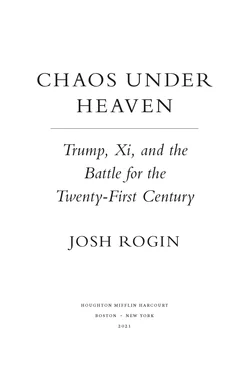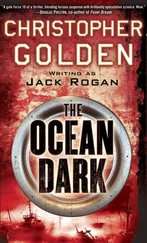The result was a chilling effect that was felt by even the most senior members of the new administration, and which lasted well beyond the first few months of Trump’s presidency. “Trump once told me, I never want to hear from you about Taiwan, Hong Kong, or the Uyghurs,” then national security adviser John Bolton, a vocal supporter of Taiwanese independence, would recall in 2019—adding, “I didn’t even want to try him on Tibet.”
The same year that Bolton made those remarks, one GOP senator would try to convince Trump to do everything possible to persuade China not to crack down on Hong Kong protesters. If Beijing ran roughshod over Hong Kong, the senator argued, China might feel emboldened to take over Taiwan next. That would be a black eye on Trump’s record, he cautioned.
The senator admitted to me that he was exaggerating the possibility of a Chinese invasion of Taiwan in an attempt to get Trump on board with a stronger stance vis-à-vis Beijing. Based on my conversations with sources inside the administration, this was not unusual; everyone talking to Trump tried to play to his vanity, ego, and political sense, rather than making a case based on any national security interest. But the words that came back from the president’s mouth were chilling.
“Taiwan is like two feet from China,” Trump told the senator. “We are eight thousand miles away. If they invade, there isn’t a fucking thing we can do about it.”
If Trump had said those words publicly, he would have been abdicating forty years of American commitment to aid Taiwan in its defense, which is written into US law, and maintain the status quo that has kept the peace between Taiwan and China. The senator was speechless. This is what Trump really believed. He just didn’t give a shit. Nobody could know—although by that point in his presidency, it’s possible that nobody would have been surprised.
3
Mar-a-Lago and Beyond
At first, only a few officials in the new administration were focused on China. Then, suddenly, everybody was. Xi Jinping was coming to Mar-a-Lago.
The summit between the Chinese and American presidents, scheduled for April 7, 2017, clearly was going to be the biggest foreign policy test of Trump’s still-young presidency. The media and the world were watching. How would this inexperienced and unpredictable US president match up with the seasoned leader of a dictatorship—one that threatened to topple America from its perch atop the world?
As far as Trump was concerned, there were two huge issues on the table: first, his need to make good on his promise to forever change the US-China trade relationship; and second, his need to confront the rising threat of North Korea’s nuclear and missile programs. For many around the president, however, there was a single, simpler goal: to forge the beginning of a relationship between Trump and Xi that was as stable and constructive as possible.
Xi, as best we know, came to the summit hoping to stave off any move toward tariffs or trade punishments. He surely also wanted to convince Trump to ignore his hawkish advisers and resume the long-standing pattern of the US-China relationship, which until this point had been characterized by long dialogues that resulted in vague promises—thereby allowing China to avoid changing its behavior.
What emerged from the weekend was a clear victory for the Chinese delegation. They succeeded in delaying any punitive trade meatures against China, and in reinforcing Trump’s belief that he and Xi had a personal friendship. Beijing would use this belief to elicit favors from Trump throughout the next four years. The American president, for his part, got to claim he had successfully navigated a complex diplomatic interaction on the way to real progress, and the hawks on his delegation had been sidelined for the time being.
But although the hawks lost this battle, they didn’t surrender in the larger war inside the administration. In fact, the Mar-a-Lago summit and its aftermath would set the stage for exactly what they had been gunning for, and what Xi most feared: a trade war between the world’s two largest economies.
Japan’s Play
Xi wasn’t the first foreign leader to visit Trump’s gaudy private club in Palm Beach. Japanese prime minister Shinzo Abe had dined there the month prior and played twenty-seven holes of golf with Trump. That visit produced the now infamous photos of Trump and Abe poring over secret intelligence about North Korea’s missile launch at their dinner table, in full view of club members.
Not only was Abe the first in line at Mar-a-Lago; he also was the first foreign leader to visit Trump Tower after the election. In their congratulatory phone call, Trump had made a vague, offhand offer to the Japanese prime minister—something to the effect of, “Hey, if you are ever in town, come stop by.” Abe seized the opportunity and showed up in New York City three days later. For the Japanese, the Abe-Trump relationship was everything. Japan’s foreign policy was so dependent on the United States, Abe had no choice but to get as close to Trump as possible.
So high were the stakes for Japan—and such was Abe’s anxiety about Trump’s unpredictability—that the prime minister and his staff went to great lengths to ensure that these meetings went off without a hitch. One official in Abe’s inner circle told me that a team in the prime minister’s office took meticulous notes of every Trump-Abe interaction during their Mar-a-Lago visit, to create a database of words, topics, and mannerisms that elicited various reactions from Trump. The idea was to figure out what things people say that make Trump happy or upset or bored.
Abe’s efforts paid off—for a time. Trump and Abe always got along well, and at first their rapport allowed Japan to navigate the relationship better than other allies, who were constantly the subject of Trump’s Twitter rants and threats. Later on, however, when Japan’s number one fear (a nuclear North Korea) was under discussion, Abe’s ability to get along with Trump provided him no real advantage. Japan pleaded with Trump to take a hard line in the negotiations, not to release the pressure, and not to trust Kim Jong Un. He did the opposite.
Open Access
At the time of the Trump-Xi summit, Mar-a-Lago was a security nightmare. Members were prescreened by the Secret Service, but their guests weren’t; they would get patted down at the entrance, but there were no background checks. Inside the club, anyone could get near the president or his conversations. Trump’s table in the main dining room had a little velvet rope that separated it from the rest. When he was there, random people would constantly saunter up to the rope to chat him up or eavesdrop on whatever conversation he was in.
Trump’s business friends abused their access all the time. For example, when Xi first walked into the club, Blackstone CEO Stephen Schwarzman was just lingering nearby, as if he was part of the official delegation. Trump himself had to nudge Schwarzman and tell him his presence at the historic occasion was inappropriate. “Xi Jinping was arriving and there’s Schwarzman walking around the ballroom near the entrance,” a senior White House official recalled. “That guy was in our receiving party. It was like, how the fuck did that guy get in here?”
Schwarzman was the rare billionaire cozying up to Trump on China who actually had known and been good friends with the president, his Palm Beach neighbor, for a very long time. He was also perhaps Wall Street’s top dealmaker with large Chinese corporations, which meant that he was connected to China’s political leadership as well. As CEO of the Blackstone Group, he made news in 2008 when he sold 9.9 percent of his company (under the limit for a security review) to a Chinese government-controlled firm called Wonderful Investments for $3 billion. When asked later how he did it, he said “the premier himself must approve” it.
Читать дальше











